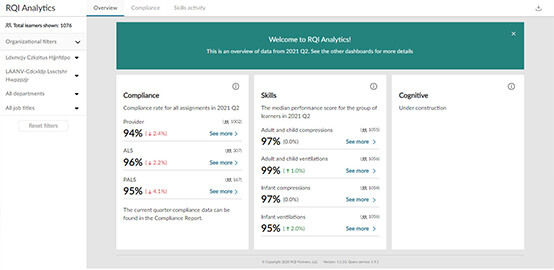Why RQI?
RQI Saved Mr. Lovelace — Nurse at U of A.
Why RQI at Salem Health
RQI Pioneers Lead the Charge
The RQI 2025 portfolio includes six programs. Learners receive an eCredential for completion of each program. RQI satisfies requirements for providers and accreditation requirements for hospitals. Programs available include:
- RQI Healthcare Provider
- RQI ALS
- RQI PALS
- RQI for NRP
- RQI Responder, geared for ancillary and support staff at RQI hospitals
- RQI for Teams: Prehospital
RQI eCredentials
RQI 2025 programs provide the learner with an eCredential that verifies the learner has demonstrated competence in the gold standard of high-quality CPR mastery by the American Heart Association with quarterly verified competence.
RQI Healthcare Provider Basic Life Support (BLS)
RQI Healthcare Provider BLS verifies competence in basic life support for adult, child and infant patients. Learners demonstrate knowledge via eLearning cognitive assessment activities and perform CPR skills on the RQI Simulation Station. Successful participation results in RQI verified eCredential and CME/CE credit.
The program uses True Adaptive learning & the RQI Simulation Station to teach, reinforce and drive mastery of knowledge & skill of the AHA 2020 Guidelines for BLS and EMS. The program consists of an online & hands-on session completed every quarter to verify high-quality CPR competence.
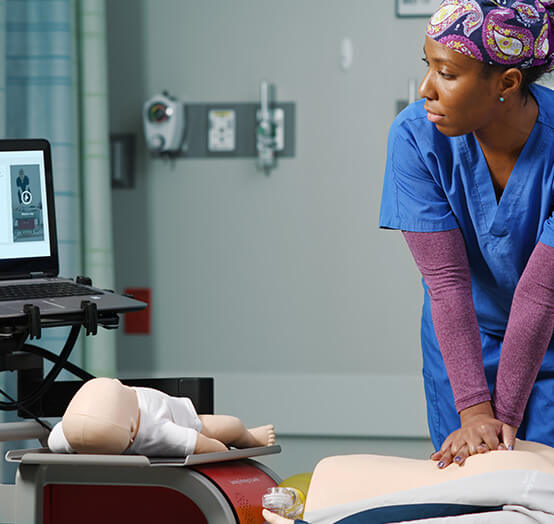
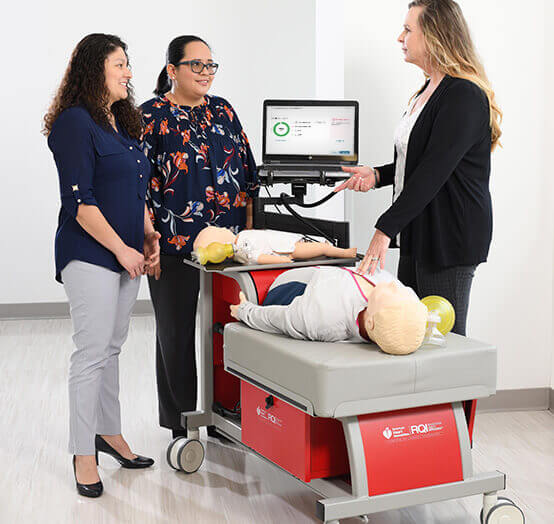
RQI Healthcare Advanced Life Support (ALS)
RQI Healthcare ALS verifies competence in advanced life support for adult patients. This program is an extension of RQI Healthcare Provider. Learners demonstrate knowledge via eLearning cognitive assessment activities; core skills in the Provider program are not repeated in ALS. Successful participation results in RQI verified eCredential and CME/CE credit.
RQI Healthcare Pediatric Advanced Life Support (PALS)
RQI Healthcare PALS verifies competence in pediatric advanced life support for infants and children. This program is an extension of RQI Healthcare Provider. Learners demonstrate knowledge via eLearning cognitive assessment activities; core skills in the Provider program are not repeated in PALS. Successful participation results in RQI verified eCredential and CME/CE credit.
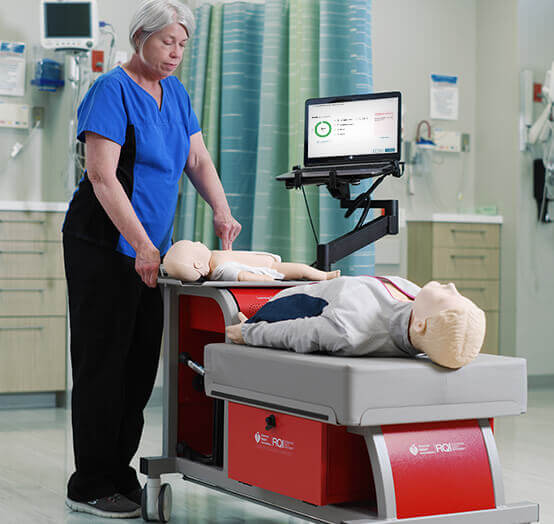
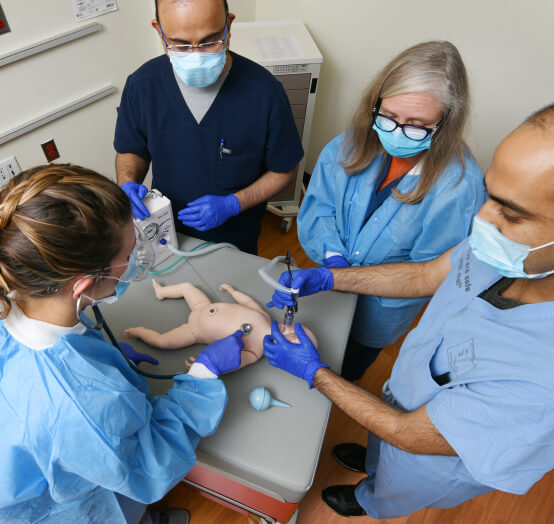
RQI for NRP®
The American Academy of Pediatrics internationally recognized Neonatal Resuscitation Program® (NRP®) is now available as a digital program within the Resuscitation Quality Improvement® (RQI®) program. This exciting new offering provides NRP providers and instructors improved lifesaving skills with a low-dose, high-frequency education model. Click here for more about the program.
RQI Responder
A wholly new program for hospital employees not directly involved in patient care. RQI Responder verifies competence in Hands-Only CPR, preparing non-clinical support staff to respond effectively and efficiently to a cardiac arrest. Successful participation twice per year results in an RQI eCredential, but does not provide CME/CE credit.
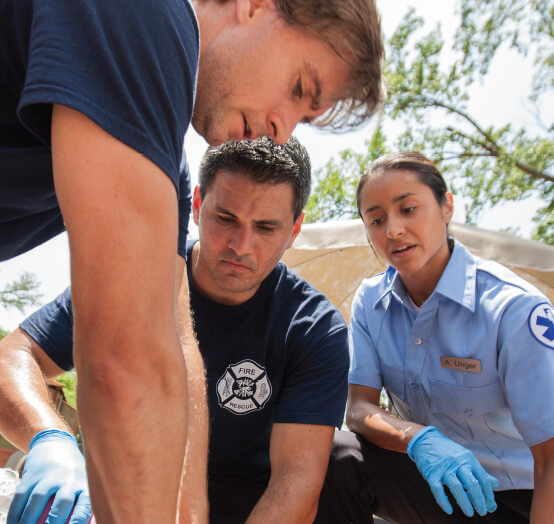
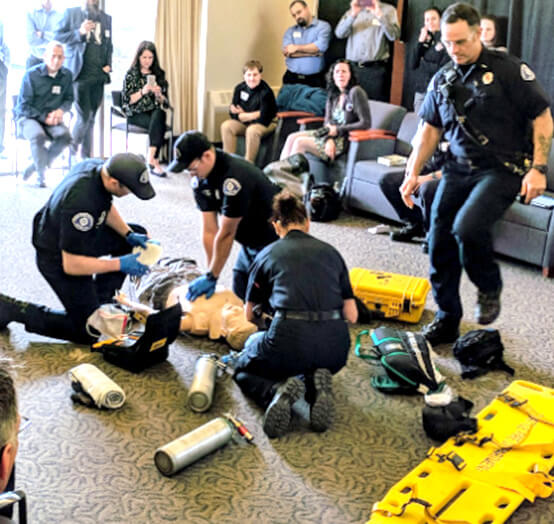
RQI for Teams: Prehospital
RQI for Teams: Prehospital is the only commercial solution that presents the Resuscitation Academy’s HPCPR process. Through a cognitive, cloud-based learning platform, learners have the unique ability to learn from the Seattle-King County Medic One faculty and subject matter experts on their tried-and-true strategies to maximize performance and minimize gaps during cardiac arrest. With a state-of-the-art high-fidelity CPR training system designed to provide real-time feedback and advanced video debriefing technology, learners are provided the tools and resources to master their skills.
Curricula Design
Learners are enrolled in RQI programs along one of two pathways based on their foundational knowledge: RQI Healthcare Provider Entry or Healthcare Provider Prep. Determining the pathway to begin RQI is at the discretion of the organization’s policy and/or RQI Administrator. Upon successful pathway completion, the learner will begin the RQI Healthcare Provider Perpetual Curriculum on the first day of the following quarter. Learners will then verify competence of their high-quality CPR skills and cognitive knowledge quarterly.
The Learner Journey
To transform resuscitation practices, RQI embeds the proven elements of mastery learning cited in the AHA’s Resuscitation Education Science: Educational Strategies to Improve Outcomes from Cardiac Arrest and 2020 Education Guidelines for Cardiopulmonary Resuscitation and Emergency Cardiovascular Care
The RQI curricula consists of both skills assessments and cognitive assessments delivered in a low-dose, high-frequency format to achieve mastery learning. Using a unique blend of cognitive learning and applied skills practice, our mastery learning model delivers content via True Adaptive learning and deliberate practice. Online, scenario-based cognitive assessments are administered on a fixed schedule and paired with psychomotor skills assessments completed at the RQI Simulation Station.
Compliance with core skills and cognitive assessment activities will result in active AHA eCredential status. This status updates quarterly with the successful completion of all assigned activities. Delivering knowledge and skills practice quarterly rather than on a traditional two-year training cycle mitigates skills decay, which translates into saving more lives.

RQI Analytics
RQI Analytics examines training performance data from participants in the Resuscitation Quality Improvement Program and presents data insights in an intuitive, easy-to-use dashboard. RQI Analytics allows administrators to track compliance and find ways to continue improving CPR skills for better outcomes across the organization.
